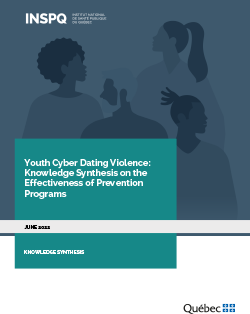Youth Cyber Dating Violence: Knowledge Synthesis on the Effectiveness of Prevention Programs
Violence in youth dating relationships is a concerning public health issue. It affects a significant number of young people and negatively impacts the health and well-being of its victims. Young people’s increasing use of technologies means that violent behaviours now occur via social media, messaging services, cell phones, and other technological devices. Youth cyber dating violence, defined as the use of these technological means to control, monitor, or harass a partner or ex-partner, is prevalent in the adolescent population and becoming increasingly well-known. The characteristics that distinguish cyberviolence from “offline” violence, such as its lack of temporal, physical, and geographical limits, underscore the importance of examining this type of violence specifically to better understand the issues associated with it. It is therefore essential to document the practices that aim to prevent youth cyber dating violence in order to determine their effectiveness and issue recommendations based on current knowledge that will contribute to their improvement.
Seven studies evaluating the effectiveness of six different prevention programs were retained. None of the selected programs has the sole objective of preventing youth cyber dating violence. Their main objectives are to prevent:
- Victimization by and/or perpetration of offline and online violence and dating cyber violence or peer relationships, or
- Victimization associated with the risks that young people may be exposed to online.
The modalities of the programs vary, i.e. the number and length of sessions involved, as well as their activities, although they all primarily aim for knowledge acquisition and/or skill building among youth.
Only two studies, evaluating two different programs, measured an effect on cyberviolence perpetration in youth dating relationships. The studies evaluating the effects of the Brief Incremental Theory of Personality (ITP) and Real Talk programs concluded that cyberviolence perpetrated by young people decreased following their participation in the programs. None of the examined programs had effects on cyberviolence victimization.
Four courses of action are proposed to improve practices and prevention programs:
- Consider the continuum between offline violence and cyber dating violence by acting on the risk and protective factors common to both.
- Develop initiatives that include components aimed at reaching out to various environments frequented by young people.
- Provide facilitators with adequate training that targets issues related to youth cyber dating violence and actively involve young people in the implementation of interventions.
- Integrate both knowledge acquisition and skill building activities into prevention programs.


